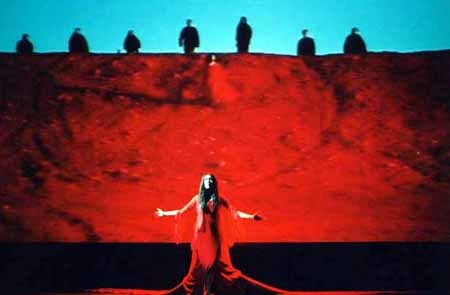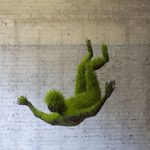The Business of Art: Fiscal Sponsorship, a NYFA Program with National Reach
For many artists, the term ‘fiscal sponsorship’ remains shrouded in mystery. Yet for those creating major projects that require access to funding opportunities restricted to nonprofits, attaining a fiscal sponsor is essential.
NYFA’s Fiscal Sponsorship program is one of the biggest of its kind in the country, and its successful track record in helping individual projects and emerging arts organizations from all over the US—in all artistic disciplines—secure corporate and foundation support makes it among the best options for artists seeking funding restricted to tax-exempt organizations.
In 2002, the celebrated Iranian-born and US-based artist Shirin Neshat performed her controversial and polarizing multimedia allegory Logic of the Birds at several venues throughout the world, including two sites in the US: the Walker Art Center in Minneapolis and the Lincoln Center Outdoor Festival in New York City. Two years earlier, the Los Angeles-based Dahlia Wilde penned Contenda, a play in which a battered woman (played by Wilde) becomes a boxer. And some twelve years before Wilde’s play—which won a Walt Disney Feature Writing Fellowship—Ghasem Ebrahimian’s debut feature film The Suitors premiered at the Cannes Film Festival and sparked dialogue about pervasive stereotypes faced by Middle Easterners living in America.
The thread uniting these disparate projects is that each received fiscal sponsorship from NYFA. A frequent misconception regarding NYFA’s Fiscal Sponsorship program is that it is restricted to New Yorkers and that projects must take place in New York. Developed in 1976, NYFA’s is one of the largest (it currently boasts about 350 projects by individuals, 60 by organizations) fiscal sponsorship programs in the US that is open to artists and organizations working in all artistic disciplines from all parts of the country.
Filmmakers, authors, choreographers, and artists of other disciplines who are initiating ambitious projects usually meet imposing financial hurdles. What’s to be done when you have an idea, but seemingly no access to major funding sources? This is where NYFA’s Fiscal Sponsorship Program can help. Foundations and individual donors seeking a tax deduction will only donate to nonprofit organizations. Government grants also must pass through a tax-exempt organization. Fiscal sponsorship allows individual artists, collaborations, and emerging arts organizations to affiliate with NYFA, a tax-exempt organization, and thus to achieve access to a far greater array of funding sources. In the words of Pamela Meadows, whose American folk musical Fair Liberty’s Call was fiscally sponsored by NYFA in 2000, “NYFA’s fundraising advice was excellent, and the prestige of being a NYFA-sponsored project enhanced our relationship with both corporate and individual donors.”
Washington, DC-based filmmaker John Wilhelm is another example of an artist who has been able to make significant progress on a multifaceted and expensive project because of fiscal sponsorship. Wilhelm is currently completing the final cut of his documentary film Triumph at Carville, A Tale of Leprosy in America, which he aims to air as a prime-time feature on PBS. Triumph focuses on the historical vilification of leprosy sufferers and presents the personal stories of victims living at the Louisiana quarantine Carville. It includes an original score composed and performed by Bela Fleck (a winner of multiple Grammy Awards). Anyone who has been involved with the filmmaking business knows of the high costs involved throughout the process, from pre- to post-production. Wilhelm said NYFA’s Fiscal Sponsorship program was recommended to him by the National Endowment for the Humanities (NEH), and thus far the relationship has helped him secure major grants from the likes of the NEH and the Irene W. and C.B. Pennington Foundation for the completion of his film.
NYFA has an extensive track record of completing major projects, in part because its consultation services (proposal reviews, reviews of fundraising strategies) help artists and organizations prepare the best possible approaches for securing corporate and foundation support. Major projects tend to require major attention to paperwork. NYFA oversees its fiscally sponsored projects’ funds, provides check writing services for both individuals and organizations, and offers bookkeeping services for organizations. Speaking on the consultation he received from NYFA’s staff for Guys Read, his fiscally sponsored literacy project for boys, John Scieszka says, “The Fiscal Sponsorship program made it all possible for me to offer people a tax-deductible way to contribute to a good cause. The program is very well organized and makes the paperwork nightmare easy to deal with.”
All of this isn’t to say that NYFA doesn’t recognize New York’s role as a preeminent center of creativity in the country. NYFA’s Fiscal Sponsorship program has supported hundreds of diverse projects by New York-based artists, from Nathaniel Kahn’s acclaimed film My Architect to Betty Beaumont’s Decompression, a sprawling online audio-visual collage of stories, documents, and images that analyzes the interconnections between science, art, and technology. Regardless of geographical location, artists or directors of emerging arts organizations who are preparing major projects may discover the answer to developing and completing them by securing fiscal sponsorship from NYFA. As Richard Ridington, Jr., whose documentary film You Must Remember This was fiscally sponsored by NYFA, says, “The sponsorship program is important for more than money. It is also about providing visibility and legitimacy to artistic work.”
The application deadline for NYFA’s next Fiscal Sponsorship cycle is November 4.
Image: Shirin Neshat, performance view of Logic of the Birds. Siracusa, Italy. 2003. (Photo: Daniele Aliffi)





